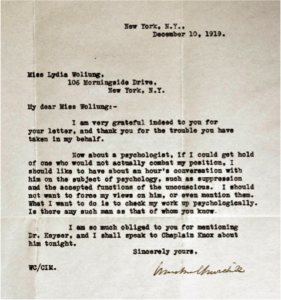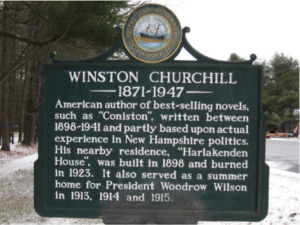My wife’s maternal grandmother, Lydia (Woliung) Faulds (1896-1939), was born in Cincinnati, Ohio. Her father was a blacksmith with family roots in Alsace. Her mother was a recent immigrant from Germany. The family later moved to Matoon, in Coles County, Illinois, where Lydia graduated from high school. After receiving a diploma from Eastern Illinois State Normal School in 1914, she taught school in the Oak Park (Illinois) school system for several years. In 1918, in recognition of her academic abilities, especially in mathematics, Lydia was elected to a position on the staff of the Lincoln School of the Teachers College within Columbia University, in New York City. Set up the year before, the Lincoln School was created to conduct “experiments in modern education.” Her assigned subjects were geography and mathematics. She resigned after one term in the expectation of the imminent return of her fiancé from war duty in France; they planned to get married back in Illinois and make a home there. He arrived as expected, but was debilitated from being gassed on the battlefield and spent most of the next year in a New York hospital. Lydia stayed in New York and was employed that year as a governess for the Rockefeller family.
Clearly she was intelligent and had developed connections in New York. But this does not explain why she received a letter from Winston Churchill in 1919, thanking her for her letter and some “trouble you have taken on my behalf.” Churchill at this time was holding two cabinet-level positions in the British government.[i] How did Lydia know him? In later years we found this was a mystery even to her daughter, Marjorie, whose knowledge of her mother’s history was limited – she was just seventeen when her mother died.
This valued letter was framed and hung on a wall in Marjorie’s family home. Whenever asked about it, she could not explain the circumstances surrounding the letter, but did say that the letter had been authenticated. Many years later, when she moved into assisted living, we surreptitiously replaced the framed letter with a photo copy, lest the original disappear, as many things do in such facilities. The original was put into a safe.
Intrigued by the mystery, my wife and I recently embarked on an investigation to discover what we could about the letter and Lydia’s connection to Winston Churchill. By happenstance, a few years earlier, we had met one of Winston Churchill’s granddaughters, Celia Sandys, in the gift shop of the Churchill Museum in London. She had just published a book on her grandfather’s life and was there signing copies of the book. We had a engaging chat, and she was quite helpful in guiding us to books on her grandfather and British history in general, which we intended for our history-loving son.
So we thought of her early in our investigation and discovered she had a website. We contacted her through that website, sent her a copy of the letter, and asked what she might be able to tell us about the letter and its circumstances. Ms. Sandys forwarded the letter to the director of the Churchill Archives, who checked into Churchill’s activities around the time period of the letter’s date, with particular attention to the fact that the letter was written from New York.
The results of his investigation were that the signature did not look quite right and Churchill had been in England when the letter was written. It was suggested that the letter was written by the American Winston Churchill. Who? An American Winston Churchill known to the British? That sent us scurrying to find information on a personage entirely unknown to us.
It was suggested that the letter was written by the American Winston Churchill. Who?
A graduate of the United States Naval Academy, Winston Churchill (1871-1947) was a novelist and writer. He was unrelated to the British statesman, (Sir) Winston Leonard Spencer-Churchill (1874–1965). The American Churchill’s books were bestsellers in the early twentieth century. In particular, Richard Carvel (1899) was a great success and made him a wealthy man.[ii] It was an historical novel written in eight volumes and took place both in the United States and in England. While best known for his novels, he also published poetry and essays. For a short time he was managing editor of the Cosmopolitan Magazine. His writings were known in England, and even in the 1890s his career was being confused with that of the British Churchill. The confusion caused the British Churchill to write a playfully confusing, yet practical, letter to the American Churchill:[iii]
London, June 7, 1899
Mr. Winston Churchill presents his compliments to Mr. Winston Churchill, and begs to draw his attention to a matter which concerns them both. He has learnt from the Press notices that Mr. Winston Churchill proposes to bring out another novel, entitled Richard Carvel, which is certain to have a considerable sale both in England and America. Mr. Winston Churchill is also the author of a novel now being published in serial form in Macmillan's Magazine, and for which he anticipates some sale both in England and America. He also proposes to publish on the 1st of October another military chronicle on the Soudan War. He has no doubt that Mr. Winston Churchill will recognize from this letter — if indeed by no other means — that there is grave danger of his works being mistaken for those of Mr. Winston Churchill. He feels sure that Mr. Winston Churchill desires this as little as he does himself. In future to avoid mistakes as far as possible, Mr. Winston Churchill has decided to sign all published articles, stories, or other works, 'Winston Spencer Churchill,' and not 'Winston Churchill' as formerly. He trusts that this arrangement will commend itself to Mr. Winston Churchill, and he ventures to suggest, with a view to preventing further confusion which may arise out of this extraordinary coincidence, that both Mr. Winston Churchill and Mr. Winston Churchill should insert a short note in their respective publications explaining to the public which are the works of Mr. Winston Churchill and which those of Mr. Winston Churchill. The text of this note might form a subject for future discussion if Mr. Winston Churchill agrees with Mr. Winston Churchill's proposition. He takes this occasion of complimenting Mr. Winston Churchill upon the style and success of his works, which are always brought to his notice whether in magazine or book form, and he trusts that Mr. Winston Churchill has derived equal pleasure from any work of his that may have attracted his attention.
The American Churchill answered in a similar fashion:[iv]
Mr. Winston Churchill is extremely grateful to Mr. Winston Churchill for bringing forward a subject which has given Mr. Winston Churchill much anxiety. Mr. Winston Churchill appreciates the courtesy of Mr. Winston Churchill in adopting the name of ‘Winston Spencer Churchill’ in his books, articles, etc. Mr. Winston Churchill makes haste to add that, had he possessed any other names, he would certainly have adopted one of them. The writings of Mr. Winston Spencer Churchill (henceforth so called) have been brought to Mr. Winston Churchill’s notice since the publication of his first story in the ‘Century’. It did not seem then to Mr. Winston Churchill that the works of Mr. Winston Spencer Churchill would conflict in any way with his own attempts at fiction.
The proposal of Mr. Winston Spencer Churchill to affix a note to the separate writings of Mr. Winston Spencer Churchill and Mr. Winston Churchill, the text of which is to be agreed on between them, — is quite acceptable to Mr. Winston Churchill. If Mr. Winston Spencer Churchill will do him the favour of drawing up this note, there is little doubt that Mr. Winston Churchill will acquiesce in its particulars.
Mr. Winston Churchill moreover, is about to ask the opinion of his friends and of his publishers as to the advisability of inserting the words ‘The American,’ after his name on the title-page of his books. Should this seem wise to them, he will request his publishers to make the change in future editions.
Mr. Winston Churchill will take the liberty of sending Mr. Winston Churchill copies of the two novels he has written. He has a high admiration for the works of Mr. Winston Spencer Churchill and is looking forward with pleasure to reading Savrola.
The British Churchill did indeed begin inserting “Spencer” into his name on any of his writings. Soon he simplified that to the initial S.[v] The American Churchill did not have a middle name with which he could embellish his name in his own writings.
Based on the lack of an initial in the signature on Lydia’s letter, on the general opinion of the director of the Churchill Archives, and on the subjects in the letter, it is clear that the letter to Lydia must have been written by the American Winston Churchill. In it he mentions an interest in psychological matters, and during the First World War he had written Dr. Jonathan; A Play in Three Acts, which dealt in part with psychological themes. But this still left us with a mystery which we have been unable to solve. Why was he corresponding with Lydia and what resources she could help him with?
Marjorie died not knowing about our investigation and its results, which we thought would be a disappointment to her. But maybe she did know that the letter to her mother was from the American Churchill. She easily could have, since she had a great interest in writing and literature, and may have known of his writings. But the existence of two Winston Churchills was never mentioned by her. And unfortunately, we never asked her how and by whom the letter had been authenticated. That might have answered our questions.
We of the next generation, for lack of knowledge of this bit of literary history, assumed that the letter had been written by the only Winston Churchill we knew of – the historic British statesman. It appears we have narrowly missed being guilty of starting a false family story (is that redundant?). At least we have saved future generations from quarreling over possession of a less-historical-than-we-thought letter. Still, the letter is an interesting keepsake, made even more so by our sleuthing adventure and a lesson in American literary history, courtesy of the British.
If you find yourself in New Hampshire, check out highway historical marker number 16, located on Route 12A in Cornish. It honors our Winston Churchill.
Notes
[i] In January of 1919 he was appointed Secretary of State for War and Secretary of State for Air.
[ii] https://en.wikipedia.org/wiki/Richard_Carvel.
[iii] Found at https://www.nationalchurchillmuseum.org/churchill-letter-to-churchill-.html.
[iv] Found at https://kottke.org/19/03/mr-winston-churchill-presents-his-compliments-to-mr-winston-churchill.
[v] “Spencer” was part of his double-barreled (and often unhyphenated) surname Spencer-Churchill. His middle name was Leonard.
Share this:

About Philip Grover
Philip Grover is a retired chemical engineer who got involved in genealogy by helping his mother enter her extensive family research into Personal Ancestral File for Mac. Little did he know then what a slippery slope that minor involvement would become. After getting deeply involved in doing his own research, he realized how disinterested family members can be in genealogical charts, lists, and diagrams. His focus since has been making his family history more interesting and accessible, and toward that end he has self-published three books of family history.View all posts by Philip Grover →

